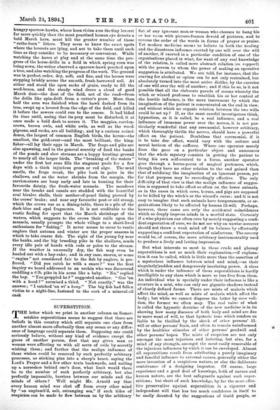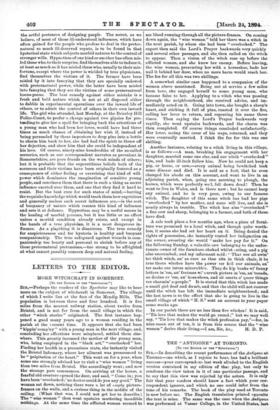SUPERSTITION.
THE letter which we print in another column on Somer- setshire superstitions seems to suggest that there are beliefs in this country which still separate one class from another almost more effectually than any ocean or any differ- ence of language could separate them. Supposing one could seriously believe, without any kind of evidence except the guess of another person, first that any given man or woman were afflicting us with all sorts of evils by secretly • wishing them ; and farther that the malign influence of these wishes could be removed by such perfectly arbitrary processes, as sticking pins into a sheep's heart, saying the Lord's Prayer and a few other texts backwards, and nailing up a horseshoe behind one's door, what limit would there be to the number of such perfectly arbitrary, but also perfectly impassable, barriers between our minds and the minds of others ? Well might Mr. Arnold say that every human mind was shut off from every other mind by "an unplumb'd, salt, estranging sea," if such tides of suspicion can be made to flow between us by the arbitrary
fiat of any ignorant man or woman who chooses to hang his or her room with picture-frames devoid of pictures, and to reverse the order of the words in forms of prayer or praise. Yet modern medicine seems to believe in both the healing • and the disastrous influence exerted by one will over the will of another, if exerted in a particular condition of one of the organisations placed in what, for want of any real knowledge of the relation, is called mere abstract relation (en rapport) with the person to whom the power of making an operative suggestion is attributed. We are told, for instance, that the craving for alcohol or opium can be not only restrained, but absolutely turned into the most active dislike, by the exercise of one will over the will of another; and if this be so, is it not possible that all the elaborate parade of means whereby the witch or wizard professes to establish his or her control of the hostile influence, is the mere instrument by which the imagination of the patient is concentrated on the end in view, and without which no organic relation between the two wills could be set up ? If, as the most careful investigators think, hypnotism, as it is called, be a real influence, and a real influence of immense power over the nerves, it is not par- ticularly wonderful that any ceremonial, however arbitrary, which thoroughly thrills the nerves, should have a powerful effect on the patient. Doubtless that ceremonial, if it is to take due effect, would vary with the culture and moral horizon of the sufferer. Where one operator merely fixes the gaze on a particular object and announces that the whole mystery consists in getting the patient to bring his own self-control to a focus, another operator goes through a hocus-pocus of magical pretences, which, though they have no other relation to the end gained than that of subduing the imagination of an ignorant person, yet for that purpose may be exceedingly effective. The only difficulty of that view is that the malign influence of sugges- tion is supposed to take effect so often on the lower animals, as in the cases in which cows, horsea, and pigs are supposed to be killed by the witch's or the wizard's curse ; and it is not easy to imagine that such animals have temperaments, or or- ganisations likely to be affected by human ill-will. Perhaps, however, these cases are only• the accidental coincidences which so deeply impress minds in a morbid state. Certainly if a wise physician can often cure by merely suggesting a confi- dent expectation of cure, we do not see why an unwise sorcerer should not throw a weak mind off its balance by effectually suggesting a confident expectation of misfortune. The sorcery would be, of course, the mere arbitrary instrumentality used to produce a lively and lasting impression.
But what interests us most in these crude and gloomy superstitions is not so much their ex planation,—if explana- tion it can be called, which is little more than the assertion of a mysterious influence between mind and mind,—as their singularlfamdden and dangerously insulating power. A class which is under the influence of these superstitions is hardly intelligible to any class which is more or less free from them. An individual who is specially under their influence is like a creature in a mist, who can only see gigantic shadows instead of clearly defined forms. There are mists of malaria which affect the mind, as well as mists of malaria which affect the body ; but while we cannot disperse the latter by mere voli- tion, the former we often may. The real value of what is called the hypnotic doctrine of the new medicine is in its showing how many diseases of both body and mind are due to mere want of will, to that hysteric tone which renders us liable to be thrilled by the shock of other persons'
ill-
will or other persons' fears, and often to remain nninflnenced by the healthier stimulus of other persons' goodwill and other persons' hopes. The mists of suspicion are not only amongst the most injurious and isolating, but also, for a mind of any strength, amongst the most easily removable of the injurious influences by which it can be enveloped. Almost all superstitions result from attributing a purely imaginary and fanciful influence to external causes, generally either the mere invention of a suspicions nature, or else the deliberate contrivance of a designing impostor. Of course, large experience and a good deal of knowlege, both of nature and human nature, are the beat safeguards against such super- stitions; but short of such knowledge, by far the most effec- tive preservative against superstition is a vigorous and independent will that has too much confidence in itself to be easily daunted by the suggestions of timid people, or
the artful pretences of designing people. The secret, as we believe, of most of those ill-understood influences, which have often gained for the people who profess to deal in the preter- natural so much ill-deserved repute, is to be found in that hysterical state which subjects morbid natures to the control of stronger wills. Hypnotism of one kind or another has often mis- led those who, to their surprise, find themselves able to induce it, at least as much as it has misled those who, usually to their mis- fortune, except where the power is wielded by tree physicians, find themselves the victims of it. The former have been misled by it into fancying that they are specially endowed with preternatural power, while the latter have been misled into fancying that they are the victims of some preternatural hocus-pocus. The beet remedy against either mistake is a fresh and bold nature which is not at all disposed either to dabble in experimental operations over the inward life of others, or to admit the control of others in their own inward life. The girl who attended, last Monday, at the Brierley Hill Police-Court, to prefer a charge against two gipsies for pre- tending to give her a spell for bringing back the attentions of a young man who had been her lover, would have had three times as much chance of obtaining her wish if, instead of being persuaded by these impostors to drop pins into a bottle to charm him back to her, she had had the spirit to throw off her dejection, and show him that she could be independent of his love. Of course, ninety-nine hundredths of the so-called soroeries, such as our correspondent narrates as prevalent in Somersetshire, are pure frauds on the weak minds of others; but it is probable that the superstitious beliefs both of the sorcerers and their victims have been originally fostered as a consequence of either feeling or exercising that kind of will- power which dominates the imagination of sensitive young people, and convinces them that there is such a thing as secret influence exerted over them, and one that they find it hard to resist. But the best cure for such states of mind,—barring the requisite knowledge which would teach them how capricious and generally useless such secret influences are,—is the sort of buoyancy of nature which resents this kind of influence and sets it at defiance. Hypnotism may be a useful means in the healing of morbid persons, but it has little or no effect unless a morbid condition already exists, and except in the hands of a true physician, it is a most dangerous in- fluence. As a plaything it is disastrous. The true remedy for suspiciousness and for hysteria is healthy and buoyant companionship. The true safeguard against wizards is com- panionship too hearty and personal to shrink before any of these preternatural pretensions,—too strong to be affrighted at what cannot possibly concern deep and natural feeling.



































 Previous page
Previous page